Knowledge Economy Unfolds via All Things Digital-Social—Wearing Passion and Personality on Your Sleeve
Discerning Web 2.0 from Web 1.0—Ron May Gets Comeuppance as Happy and Successful
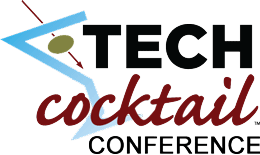 Web 2.0 entrepreneurs, financiers and professional services folk descended on Loyola University Chicago’s Lewis Hall 29 May 2008 for “Tech Conference,” TechCocktail’s first ever day-long educational event. Founders Frank Gruber and Eric Olson served an effervescent yet heady elixir of heart-to-heart war stories, lessons learned and strategies by entrepreneurs, venture capitalists, lawyers, accountants and an executive coach. Web 2.0 entrepreneurs, financiers and professional services folk descended on Loyola University Chicago’s Lewis Hall 29 May 2008 for “Tech Conference,” TechCocktail’s first ever day-long educational event. Founders Frank Gruber and Eric Olson served an effervescent yet heady elixir of heart-to-heart war stories, lessons learned and strategies by entrepreneurs, venture capitalists, lawyers, accountants and an executive coach.
Since attending TechCocktail 1 in July 2006, I have promoted the periodic TechCocktail “meetups” to everyone who will listen as the place to learn about and connect with Web 2.0 players and technology in Chicago (elsewhere now, too). Frank and Eric have created one of the most worthwhile groups and communities in the city and were recognized in the ITA’s Citylights this year. Their first conference was both high value and quintessentially Web 2.0: speakers were open about what had worked and what hadn’t. The program was well balanced, organized and entertaining. There were considerable lessons for […]
“Yes,” Says Team of Healthcare Experts, Employer CEOs and Patient Representative at the Executives’ Club of Chicago, “But You Must Change Your Ways”
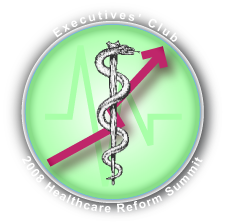 Honestly Assessing Quality—Engaging Consumer Empowerment—Trading in the Ferrari for a Chevy Honestly Assessing Quality—Engaging Consumer Empowerment—Trading in the Ferrari for a Chevy
The Executives’ Club of Chicago convened its healthcare reform summit at the Hilton Chicago on 20 February 2008, drawing on diverse expertise. Ian Morrison, Ph.D., healthcare futurist, gave the keynote and moderated two panels: first, the healthcare expertise panel with Dean Harrison, CEO Northwestern Memorial Healthcare; William Novelli, CEO AARP; Scott P. Serota, CEO BlueCross BlueShield Association; and second, the business executive panel with Andrew M. Appel, Chairman AON Consulting; John A. Edwardson, CEO, CDW; John B. Menzer, Vice Chairman and Administrative Officer, Wal-Mart Stores. Robert L. Parkinson, CEO, Baxter Healthcare gave an insightful point of view on recommended actions to close the event.
There was broad agreement that the U.S. healthcare system was broken, and speakers offered excellent insights and perspectives about how to fix the system. However, what they didn’t say was as interesting as what they did, and I will address two key issues in […]
Web 2.0 Impact on 2008 U.S. Presidential Election Declared Minimal at Executives’ Club, but cantankerous subtext hints at possible monkey wrench—democratic race in spotlight.
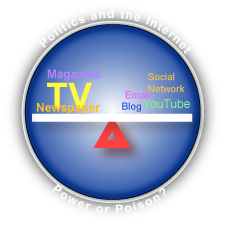 The Executives’ Club of Chicago fielded an expert panel to brief Midwest executives on Web 2.0’s current and likely impact on one of the most watched U.S. elections in recent history. Marie Cocco, a renowned political columnist, Peter Greenburger, Director of Google’s Elections & Issue Advocacy Team, and Alan Webber, Senior Analyst of Forrester Research brought to bear diverse perspectives on the question at the event, which took place at The University Club on January 31, 2008. The Executives’ Club of Chicago fielded an expert panel to brief Midwest executives on Web 2.0’s current and likely impact on one of the most watched U.S. elections in recent history. Marie Cocco, a renowned political columnist, Peter Greenburger, Director of Google’s Elections & Issue Advocacy Team, and Alan Webber, Senior Analyst of Forrester Research brought to bear diverse perspectives on the question at the event, which took place at The University Club on January 31, 2008.
They produced a logical conclusion, namely that Web 2.0 was a force in the making but that it would probably not be a decisive factor this year. The session was graciously co-hosted by Communications Committee Co-Chairs David Prosperi, Vice President Global Public Relations, AON and David Blake, Publisher of Crain’s Chicago Business.
As usual, I will share my notes of speakers’ remarks before adding my between the lines analysis and conclusions. As an […]
Year in Review 2007—Editor’s Choice of the Global Human Capital Journal
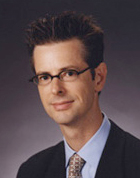 As I reflect on 2007 and create strategy for 2008, several macro-trends come into sharp relief, and I believe that some of them might be helpful to you as you conduct your own planning. As always, I focus on emerging phenomena because they are areas in which disruption and discontinuous change are acting on markets, thereby elevating threats and opportunities. Helping leaders to create strategy to manage the risk of unusual market developments is the focus of my consulting practice. As I reflect on 2007 and create strategy for 2008, several macro-trends come into sharp relief, and I believe that some of them might be helpful to you as you conduct your own planning. As always, I focus on emerging phenomena because they are areas in which disruption and discontinuous change are acting on markets, thereby elevating threats and opportunities. Helping leaders to create strategy to manage the risk of unusual market developments is the focus of my consulting practice.
In 2007 it became clear to me that we were entering a profound social transformation that would produce an unimaginable degree of change. Unlike the technology-precipitated change that I’ve been helping people with since the 1990s, technology is shifting to the background now, and pervasive social change is taking the stage. Look for disruption in all areas affected by how people connect, communicate, purchase and collaborate: business, politics, community and leisure. Moreover, these changes are completely global with all the variations that engenders.
I can’t tell […]
Three CIOs Share Vision and Techniques for Creating the Networked Enterprise—Facebook and Tagging Creep In
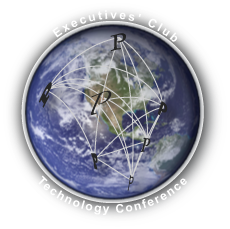 After James Owens’ luncheon address, the Executives’ Club of Chicago’s 2007-08 Technology Conference series opened with the CIO of the Year Award and a sneak preview of the 2008 Chicago Technology Outlook Survey. After James Owens’ luncheon address, the Executives’ Club of Chicago’s 2007-08 Technology Conference series opened with the CIO of the Year Award and a sneak preview of the 2008 Chicago Technology Outlook Survey.
Then a diverse panel of executives took the stage to discuss the role of the CIO in the “networked economy 2.0.” Bahman Koohestani, Senior Vice President & Chief Information Officer, Orbitz Worldwide, Paul Mankiewich, Chief Technology Officer, Alcatel-Lucent and Karenann Terrell, Chief Information Officer, Baxter International, shared their visions for the evolving role of the CIO and IT. John Gentry, Partner and Managing Director, CSC Consulting, moderated the panel discussion with aplomb. The Club’s quarterly Technology Conference took place October 16 at the Chicago Hilton.
Although the panel represented such diverse businesses as pharmaceutical giant Baxter, global network equipment provider Alcatel-Lucent and travel sensation Orbitz, all were very focused on how CIOs needed to enable a new level of innovation by fostering a new level of trust and adopting a networked model—for everything. […]
How Social Tagging Changes the Economics of Ecommerce was a geeky session that explained how a potent mix of “people like me” navigation and digital leverage can drive sales and profits + The secret to emerging markets?
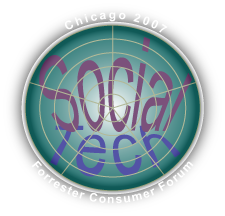 The Global Human Capital Journal’s coverage of the Forrester Consumer Forum 2007 continues with this session on social tagging. Before your eyes glaze over, bear with me and learn how this simple, revolutionary social technology can help your customers to help your business. Forrester’s Sarah Rotman Epps moderated a discussion with Brian Rosenblat, Online Retail Industry Lead, Endeca Technologies and Jay Shaffer, Vice President Marketing, PowerReviews, who represented companies that offer social tagging solutions, and they all shared numerous examples. The Global Human Capital Journal’s coverage of the Forrester Consumer Forum 2007 continues with this session on social tagging. Before your eyes glaze over, bear with me and learn how this simple, revolutionary social technology can help your customers to help your business. Forrester’s Sarah Rotman Epps moderated a discussion with Brian Rosenblat, Online Retail Industry Lead, Endeca Technologies and Jay Shaffer, Vice President Marketing, PowerReviews, who represented companies that offer social tagging solutions, and they all shared numerous examples.
This was one of the most “actionable opportunity” sessions of the conference: tagging is a relatively unknown, simple, yet transformational Web 2.0 phenomenon that will gain traction in 2008 and explode in 2009. If you aren’t doing it, you will be at a significant disadvantage to your competitors who do.
The Global Human Capital Journal published the overall conference […]
Web 2.0 World Challenges Brands to Understand Value Propositions—Inner Human Desire Is the Keel
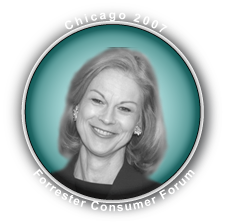 The Global Human Capital Journal’s coverage of the Forrester Consumer Forum 2007 continues with this session on Playboy Enterprises’ experience with integrating social technologies into its multichannel offerings. Christie Hefner, Chairman and CEO, gave a doubly-valuable presentation because she addressed her company’s journey to online customer engagement and explained how Playboy’s transition was affecting its advertisers. It was obvious that she is a leader who rolls up her sleeves and understands her business. The Global Human Capital Journal’s coverage of the Forrester Consumer Forum 2007 continues with this session on Playboy Enterprises’ experience with integrating social technologies into its multichannel offerings. Christie Hefner, Chairman and CEO, gave a doubly-valuable presentation because she addressed her company’s journey to online customer engagement and explained how Playboy’s transition was affecting its advertisers. It was obvious that she is a leader who rolls up her sleeves and understands her business.
The Global Human Capital Journal published the overall conference wrap as well as in-depth coverage of several sessions. Access all through the link to the conference logo. Other articles will be published in the days ahead, and we invite you to subscribe to the forum’s RSS feed to be notified as they are published.
Hefner’s advice for senior marketers was to remember that human beings are not fundamentally being changed, even though the way in which they relate and communicate may be changing dramatically. Our humanity, desires and impulses are a constant. Moreover, the […]
Social Computing at an Inflection Point—Preparing to Be Overwhelmed
 The Global Human Capital Journal’s coverage of the Forrester Consumer Forum 2007 continues with this session on Delta’s experience with customer blogs. Moderator Henry H. Harteveldt did an excellent job setting up the session and letting Laura R. Hunnicutt, Delta’s General Manager of Customer Experience, talk with the audience about some real-world practical problems of moving executives’ legacy thinking to Web 2.0. Having enterprise visionaries and thought leaders added tremendous value to the conference. The Global Human Capital Journal’s coverage of the Forrester Consumer Forum 2007 continues with this session on Delta’s experience with customer blogs. Moderator Henry H. Harteveldt did an excellent job setting up the session and letting Laura R. Hunnicutt, Delta’s General Manager of Customer Experience, talk with the audience about some real-world practical problems of moving executives’ legacy thinking to Web 2.0. Having enterprise visionaries and thought leaders added tremendous value to the conference.
The Global Human Capital Journal published the overall conference wrap and will have several other in-depth articles in the days ahead. You can be notified as to their publication by subscribing to the forum’s RSS feed.
This session showed that social computing can have a powerful strategic impact at inflection points in companies’ histories. As everyone knows, Delta is recently out of bankruptcy, and the airline business is difficult on a good day. The company is in a period of high risk-high reward, and Laura gave the audience a heartfelt behind-the-scenes look at the company’s Web […]
Over-Publicized Problems and Unusual Opportunities—A Way to Monetize Collaboration?
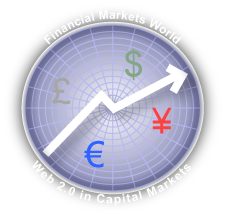 Financial Markets World held its conference, Web 2.0/Enterprise 2.0 in the Capital Markets Industry, in New York City on 17 September 2007. Invited as a panelist on the bleeding edge track, “Web 3.0: Where Are We Going,” I nonetheless had time to scribble some notes to cover some of the sessions. Financial Markets World held its conference, Web 2.0/Enterprise 2.0 in the Capital Markets Industry, in New York City on 17 September 2007. Invited as a panelist on the bleeding edge track, “Web 3.0: Where Are We Going,” I nonetheless had time to scribble some notes to cover some of the sessions.
Enterprise 2.0 is being adopted by investment banks and the capital markets industry, but adoption is being dampened by two flies in the ointment: 1) the industry is highly regulated, and compliance forces firms to have control of their data, which means CIOs are hesitant to try new technology that may introduce risk; 2) enterprise 2.0 doesn’t yet have a locked and loaded business case. It’s early, and all conference sessions reflected that.
The Global Human Capital Journal’s coverage comprises summaries of all the sessions, as well as more in-depth coverage of three of the sessions. To access all the articles in one click, use the Financial Markets World tag. This article contains the summaries as well as my analysis and conclusions of […]
Redefining the Industry to Remain Relevant—The Significance of AT&T’s Big Bet on Mobile
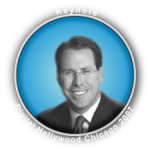 At Digital Hollywood Chicago, AT&T was busy redefining itself as a 21st century communications provider, and we believe that will increasingly mean focusing on content to provide profits. An AT&T veteran but new in 2007 as CEO, Randall Stephenson keynoted the conference by sharing his vision for AT&T and the future of the industry. At Digital Hollywood Chicago, AT&T was busy redefining itself as a 21st century communications provider, and we believe that will increasingly mean focusing on content to provide profits. An AT&T veteran but new in 2007 as CEO, Randall Stephenson keynoted the conference by sharing his vision for AT&T and the future of the industry.
Telecoms provide the network infrastructure of distributed computing and global communications, but infrastructure is a tough business with thin margins and high capital requirements. All telecoms are trying to move up the value chain to escape commoditization pressure and relentless price competition. For example, Sprint is betting heavily on WiMAX to redefine itself as the enabler of digital relationships.
In the context of telecoms redefinition, AT&T’s alliance with Apple could be very strategic for each company, as AT&T can use Apple’s design excellence to increase subscribers and push advanced network services while Apple needs a telecom partner to drive its relevance in the growing third screen market with the iPhone. According to Stephenson, the […]
|
|
 Web 2.0 entrepreneurs, financiers and professional services folk descended on Loyola University Chicago’s Lewis Hall 29 May 2008 for “Tech Conference,” TechCocktail’s first ever day-long educational event. Founders Frank Gruber and Eric Olson served an effervescent yet heady elixir of heart-to-heart war stories, lessons learned and strategies by entrepreneurs, venture capitalists, lawyers, accountants and an executive coach.
Web 2.0 entrepreneurs, financiers and professional services folk descended on Loyola University Chicago’s Lewis Hall 29 May 2008 for “Tech Conference,” TechCocktail’s first ever day-long educational event. Founders Frank Gruber and Eric Olson served an effervescent yet heady elixir of heart-to-heart war stories, lessons learned and strategies by entrepreneurs, venture capitalists, lawyers, accountants and an executive coach.
 Honestly Assessing Quality—Engaging Consumer Empowerment—Trading in the Ferrari for a Chevy
Honestly Assessing Quality—Engaging Consumer Empowerment—Trading in the Ferrari for a Chevy The Executives’ Club of Chicago fielded an expert panel to brief Midwest executives on Web 2.0’s current and likely impact on one of the most watched U.S. elections in recent history. Marie Cocco, a renowned political columnist, Peter Greenburger, Director of Google’s Elections & Issue Advocacy Team, and Alan Webber, Senior Analyst of Forrester Research brought to bear diverse perspectives on the question at the event, which took place at The University Club on January 31, 2008.
The Executives’ Club of Chicago fielded an expert panel to brief Midwest executives on Web 2.0’s current and likely impact on one of the most watched U.S. elections in recent history. Marie Cocco, a renowned political columnist, Peter Greenburger, Director of Google’s Elections & Issue Advocacy Team, and Alan Webber, Senior Analyst of Forrester Research brought to bear diverse perspectives on the question at the event, which took place at The University Club on January 31, 2008. As I reflect on 2007 and create strategy for 2008, several macro-trends come into sharp relief, and I believe that some of them might be helpful to you as you conduct your own planning. As always, I focus on emerging phenomena because they are areas in which disruption and discontinuous change are acting on markets, thereby elevating threats and opportunities. Helping leaders to create strategy to manage the risk of unusual market developments is the focus of my consulting practice.
As I reflect on 2007 and create strategy for 2008, several macro-trends come into sharp relief, and I believe that some of them might be helpful to you as you conduct your own planning. As always, I focus on emerging phenomena because they are areas in which disruption and discontinuous change are acting on markets, thereby elevating threats and opportunities. Helping leaders to create strategy to manage the risk of unusual market developments is the focus of my consulting practice. After James Owens’ luncheon address, the Executives’ Club of Chicago’s 2007-08 Technology Conference series opened with the CIO of the Year Award and a sneak preview of the 2008 Chicago Technology Outlook Survey.
After James Owens’ luncheon address, the Executives’ Club of Chicago’s 2007-08 Technology Conference series opened with the CIO of the Year Award and a sneak preview of the 2008 Chicago Technology Outlook Survey. The Global Human Capital Journal’s coverage of the Forrester Consumer Forum 2007 continues with this session on social tagging. Before your eyes glaze over, bear with me and learn how this simple, revolutionary social technology can help your customers to help your business. Forrester’s Sarah Rotman Epps moderated a discussion with Brian Rosenblat, Online Retail Industry Lead, Endeca Technologies and Jay Shaffer, Vice President Marketing, PowerReviews, who represented companies that offer social tagging solutions, and they all shared numerous examples.
The Global Human Capital Journal’s coverage of the Forrester Consumer Forum 2007 continues with this session on social tagging. Before your eyes glaze over, bear with me and learn how this simple, revolutionary social technology can help your customers to help your business. Forrester’s Sarah Rotman Epps moderated a discussion with Brian Rosenblat, Online Retail Industry Lead, Endeca Technologies and Jay Shaffer, Vice President Marketing, PowerReviews, who represented companies that offer social tagging solutions, and they all shared numerous examples. The Global Human Capital Journal’s coverage of the Forrester Consumer Forum 2007 continues with this session on Playboy Enterprises’ experience with integrating social technologies into its multichannel offerings. Christie Hefner, Chairman and CEO, gave a doubly-valuable presentation because she addressed her company’s journey to online customer engagement and explained how Playboy’s transition was affecting its advertisers. It was obvious that she is a leader who rolls up her sleeves and understands her business.
The Global Human Capital Journal’s coverage of the Forrester Consumer Forum 2007 continues with this session on Playboy Enterprises’ experience with integrating social technologies into its multichannel offerings. Christie Hefner, Chairman and CEO, gave a doubly-valuable presentation because she addressed her company’s journey to online customer engagement and explained how Playboy’s transition was affecting its advertisers. It was obvious that she is a leader who rolls up her sleeves and understands her business. The Global Human Capital Journal’s coverage of the Forrester Consumer Forum 2007 continues with this session on Delta’s experience with customer blogs. Moderator Henry H. Harteveldt did an excellent job setting up the session and letting Laura R. Hunnicutt, Delta’s General Manager of Customer Experience, talk with the audience about some real-world practical problems of moving executives’ legacy thinking to Web 2.0. Having enterprise visionaries and thought leaders added tremendous value to the conference.
The Global Human Capital Journal’s coverage of the Forrester Consumer Forum 2007 continues with this session on Delta’s experience with customer blogs. Moderator Henry H. Harteveldt did an excellent job setting up the session and letting Laura R. Hunnicutt, Delta’s General Manager of Customer Experience, talk with the audience about some real-world practical problems of moving executives’ legacy thinking to Web 2.0. Having enterprise visionaries and thought leaders added tremendous value to the conference. Financial Markets World held its conference, Web 2.0/Enterprise 2.0 in the Capital Markets Industry, in New York City on 17 September 2007. Invited as a panelist on the bleeding edge track, “Web 3.0: Where Are We Going,” I nonetheless had time to scribble some notes to cover some of the sessions.
Financial Markets World held its conference, Web 2.0/Enterprise 2.0 in the Capital Markets Industry, in New York City on 17 September 2007. Invited as a panelist on the bleeding edge track, “Web 3.0: Where Are We Going,” I nonetheless had time to scribble some notes to cover some of the sessions. At Digital Hollywood Chicago, AT&T was busy redefining itself as a 21st century communications provider, and we believe that will increasingly mean focusing on content to provide profits. An AT&T veteran but new in 2007 as CEO, Randall Stephenson keynoted the conference by sharing his vision for AT&T and the future of the industry.
At Digital Hollywood Chicago, AT&T was busy redefining itself as a 21st century communications provider, and we believe that will increasingly mean focusing on content to provide profits. An AT&T veteran but new in 2007 as CEO, Randall Stephenson keynoted the conference by sharing his vision for AT&T and the future of the industry.